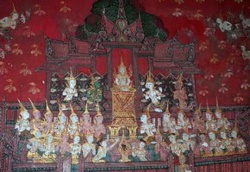Heaven
Heaven (devaloka or sagga) is one of the six states beings can take Rebirth in, the others being the Human realm, the Animal realm, the realm of jealous spirits, the realm of hungry spirits and Purgatory. Heaven is a realm or state that is primarily pleasant and where the lifespan is very long. Buddhism recognizes seven heavens – (1) the Cātumahārājika Heaven,
(2) the Tāvatiṃsa Heaven,
(3) the Heaven of Yāma,
(4) the Tusita Heaven,
(5) the Nimmānaratī Heaven,
(6) the Paranimmita Heaven and
(7) the Brahma heaven.
All the heavens were believed to have different spheres within them. These heavens and their various subdivisions are perhaps equivalent to the nine angelic realms of Christian theology, and the celestial beings that inhabit them are similar to the Christian seraphims, cherubims, thrones, archangels and angels.
People who have developed positive emotions to a high degree – kindliness, acceptance, innocence, Love – without necessarily being very wise, tend to be reborn in one or the other heavens. However, The Buddha said one should be ‘turned off, repelled and disgusted’ (aṭṭiyeyyātha, harāyeyyātha, jiguccheyyātha) by the idea of practising the Dhamma just for the purpose of being reborn in heaven (A.I,115). While heaven is far better than Purgatory or the realms of Animals, jealous spirits or hungry spirits, The Buddha considered it to be inferior to the Human realm. Because their experience is so pleasurable, beings in the heaven realm have neither the opportunity nor the encouragement to develop Virtue or understanding. And, of course, when their lifespan comes to an end (like all states, heaven is Impermanent) they will be reborn yet again.
heaven
[天] (Skt, Pali deva-loka; Jpn ten )
In Buddhism, a realm of heavenly beings. Buddhism describes twenty-eight heavens or heavenly realms (twenty-six or twenty-seven according to different sources) in the threefold world. In ascending order, there are the six heavens in the world of desire, the eighteen heavens in the world of form, and the four heavens in the world of formlessness. These heavens are ranked in quality according to their elevation. The first and lowest heaven is the Heaven of the Four Heavenly Kings, located halfway up Mount Sumeru. The highest heaven is the Heaven of Neither Thought Nor No Thought. This heaven is regarded as the realm where those who have accumulated good fortune will be reborn, though it still belongs to the six paths of existence, a realm still encumbered by transmigration and delusion. Heaven, or the world of heavenly beings, is also the sixth of the Ten Worlds. Based on the philosophy of the Lotus Sutra, this can be viewed as a potential state or condition of human life. In The Object of Devotion for Observing the Mind, Nichiren (1222-1282) writes, "Joy is [the world] of heaven" (358). This describes the condition of contentment and joy one feels when released from suffering or upon satisfaction of some desire. Such joy disappears with the passage of time or with even a slight change in the circumstances. "Heaven" is therefore included within the six paths—states of life that are relatively passive and subject to changes in one's sur-roundings.
The Gods in Early Buddhism, M. M. Marasinghe,1976.
